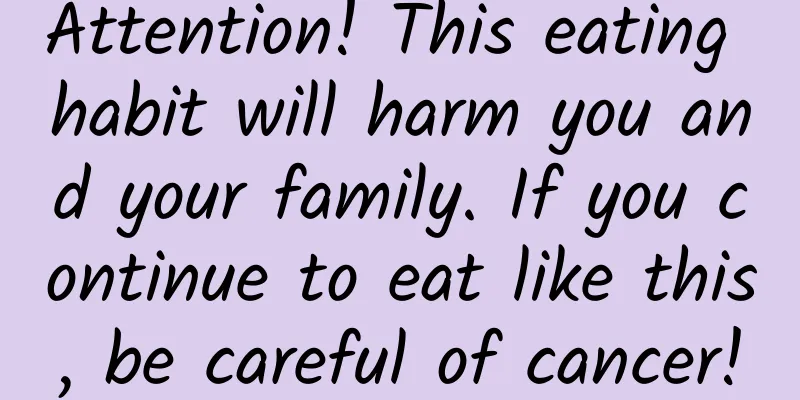Attention! This eating habit will harm you and your family. If you continue to eat like this, be careful of cancer!

|
April 15 to April 21 is the 29th National Cancer Prevention and Treatment Publicity Week, with the theme of "Cancer Prevention and Treatment, Comprehensive Action - All People, All Cycles, All Society". It is understood that the early symptoms of esophageal cancer are atypical and hidden, and it is often in the middle and late stages when it is discovered . Therefore, early detection and early treatment are particularly important. 01 How does esophageal cancer occur? The esophagus is an important part of the human digestive tract. The length of an adult esophagus is 25 cm and the diameter is 2.5 cm. Due to the influence of other tissue structures, the esophagus has three narrow places in morphology: the first is at the intersection of the esophagus and the pharynx; the second is at the intersection of the esophagus and the left main bronchus; the third is at the esophageal hiatus where the esophagus passes through the diaphragm. Long-term consumption of food that is too hot, too hard, too salty, or moldy will damage the esophageal mucosal epithelium, especially in the three narrow areas of the esophagus. Because the food stays in the esophagus longer and is more irritating, it is more likely to develop cancer. Copyright image, no permission to reprint 02 What are the risk factors for esophageal cancer? 1. Diet Chinese people love to eat hot food, and the elderly often say "Come on, eat it while it's hot". Especially in Henan, Hebei, Shanxi and other places in China, it is cold in winter, and a mouthful of hot porridge, hot noodles, and hot tea comfort the body and mind of the returning family. But our esophageal mucosa is delicate and afraid of high temperatures. If it exceeds 50℃, the esophageal mucosal cells will be burned. Occasional one or two burns, the cells will slowly repair themselves. If you don't pay attention for a long time and get burned repeatedly, the esophageal mucosal cells will not have time to repair, and the mucosa in the damaged area may proliferate until it becomes cancerous . Copyright image, no permission to reprint In addition, eating too fast or eating too hard food can also increase the risk of esophageal cancer. Eating too fast and not chewing carefully enough can cause large pieces of food to damage the esophageal mucosa; eating too hard food can cause the hard edges to scratch the esophagus. In addition, long-term consumption of overly salty food can also increase the risk of esophageal cancer. For example, pickled food contains a large amount of nitrite, which can react with the degradation products of amino acids to produce highly carcinogenic nitrosamines. 2. Trace element content Trace elements refer to elements whose content in the human body is less than 0.005%~0.01% of the human body mass, including iron, zinc, molybdenum, fluorine, selenium, etc. Esophageal cancer has a very obvious relationship with our nutritional level and vitamin intake. The serum molybdenum and molybdenum in esophageal cancer tissues in the high-risk population of esophageal cancer are lower than normal levels. Some researchers have measured trace elements in the natural environment of areas with a high incidence of esophageal cancer in my country and found that the molybdenum and zinc content in the local soil is low. In the era of material scarcity, such cases caused by trace element deficiency occurred from time to time, but with the improvement of living standards, this situation is now rare. 3. Genetics If there is a history of esophageal cancer among first-degree relatives (parents, children, and siblings), the probability of developing esophageal cancer is significantly increased. 4. Tobacco and alcohol Long-term heavy smoking and drinking can damage the esophageal mucosa and increase the risk of esophageal cancer. Copyright image, no permission to reprint 5. Gastroesophageal reflux During gastroesophageal reflux, the contents of the stomach, including bile and bile acid, will flow back into the esophagus, causing damage to the esophageal mucosa. This damage increases the risk of esophageal cancer. Barrett's esophagus, in particular, is a serious complication of gastroesophageal reflux disease and is a globally recognized precancerous lesion of esophageal adenocarcinoma. Its canceration rate is 30 to 50 times that of normal people! 03 What are the symptoms of mid-to-late stage esophageal cancer? Esophageal cancer is a very hidden disease. In the early stage, there are no typical symptoms and it is easy to be ignored. In the middle and late stages, as the disease progresses, some typical symptoms will appear. Dysphagia. When the upper or entire esophagus is blocked by a tumor, dysphagia will occur. At first, it will be difficult to swallow dry and hard food, and later it will gradually develop into difficulty swallowing liquid food, and eventually even swallowing water and saliva will be difficult. Copyright image, no permission to reprint Foreign body sensation in the esophagus. When a tumor grows at the upper end of the esophagus, it is easy to experience a foreign body sensation in the esophagus, which means that you always feel that there is something in the esophagus and you can't swallow it. Dryness and tightness in the throat. In the late stage of esophageal cancer, the esophageal mucosa's ability to secrete mucus deteriorates, which can lead to dryness in the throat. Food retention. In the late stage of esophageal cancer, the tumor is relatively large and blocks the esophagus. When eating, the food will flow slowly or even be blocked. Pain behind the sternum after eating. In the late stage of esophageal cancer, cancer cells metastasize to tissues outside the esophagus and affect adjacent organs and nerves. This pain is usually persistent and mild at the beginning, but can continue to worsen as the disease progresses. 04 How to screen for esophageal cancer? Esophageal cancer is extremely hidden and cannot be accurately diagnosed from symptoms. The best way is to have regular physical examinations . The gold standard for esophageal cancer examination is gastroscopy, which not only allows the examinee to complete the examination, but also allows treatment under gastroscopy after early esophageal cancer is detected. Experts recommend that the first gastroscopy should be done at around the age of 50. For high-risk groups, such as those in areas with a high incidence of esophageal cancer (Taihang Mountain, Chaoshan, Sichuan Basin, Xinjiang Kazakhstan, etc.), patients with gastroesophageal reflux, family history of esophageal cancer, and poor eating habits, the first gastroscopy can be done at the age of 40. Cancer prevention physical examinations do not guarantee that you will never get cancer, but they can help you avoid middle- and late-stage cancers to the greatest extent possible. Early-stage cancers are mostly curable, especially for esophageal cancer. Stay away from esophageal cancer and let us protect our fragile esophagus together. Source: CCTV Finance "Workplace Health Course" The cover image and the images in this article are from the copyright library Reproduction of image content is not authorized |
<<: Why is the sky blue? And not all seven colors like a rainbow?
Recommend
Commercial Illustration System Course Basics + Advanced
Commercial illustration system course basics + ad...
The thicker the down jacket, the warmer it is? Duck down or goose down is better? Understand these to avoid being cheated...
Expert of this article: Zhu Guangsi, science writ...
Google develops MicroDroid, a stripped-down version of Android for virtual machines
XDA Developers said that Google is developing a s...
Some money-making opportunities and marketing trends for 2017!
It is easy to make small money but difficult to m...
It’s hard to get a shot to lose 20 pounds without doing anything! Is the “most powerful weight loss drug in history” recommended by Musk suitable for you?
Recently, a "magic drug" for weight los...
9 Things Cancer Cells Fear the Most, Be Sure to Do Them More Often! Save Them Now
When it comes to cancer, many people are frighten...
If a flamingo eats blue food, will it turn blue?
In the colorful natural world, many mysteries of ...
On the surface, everything seems calm, but secretly he is going crazy! Who is keeping his emotions stable?
“Be an emotionally stable person” Gradually becom...
Liu Xiaohu's five steps to build a beautiful buttocks with Pilates and Victoria's Secret
Liu Xiaohu's five-step Pilates Victoria's...
Content, community, and brand are three in one, curing traffic anxiety
Starting from the content mechanism of WeChat, th...
Graduated from a vocational high school and started from a junior college, why is he one of the top 2% of scientists in the world?
On September 16, 2024, Stanford University in the...
Wuzhen Index: 2017 Global Artificial Intelligence Development Report (Investment and Financing)
Based on massive data, the Wuzhen Index: Global A...
How to make 20,000 yuan a month on a photo site, teach you step by step how to run a website to make money [video course]
How to make 20,000 yuan a month on a photo site, ...
Pagodas suppress sea monsters! The killer of the Ordovician ocean: Sinian hornstone
The New Bride Stone in Nanyan, the thunderbolt pr...
Are you only focusing on meat, eggs and milk to supplement protein? You are also missing this "treasure" protein
Speaking of protein Many people's first react...









